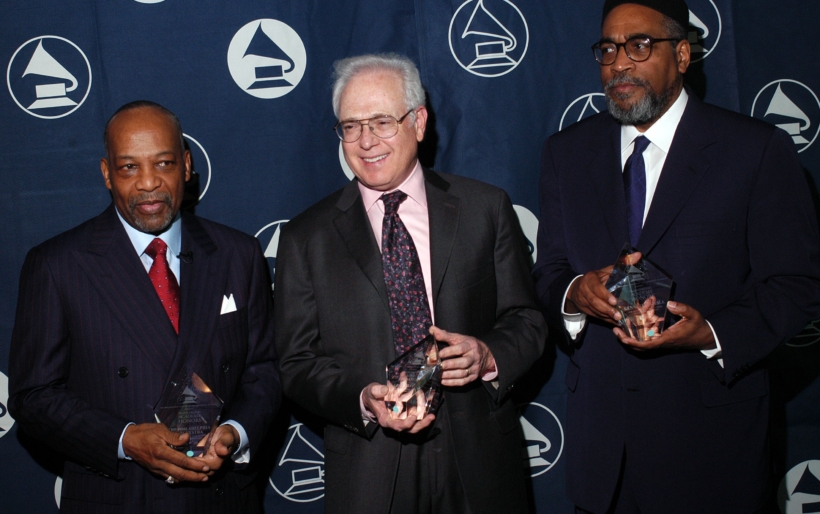
PHILADELPHIA – APRIL 10: From left, honorees Leon Huff, Larry Magid, and Kenny Gamble pose backstage at the Recording Academy Honors 2006 April 10, 2006 in Philadelphia, Pennsylvania. The Philadelphia Chapter held the event to salute outstanding individuals and institutions for their contributions to the creative community and the community-at-large. (Photo by William Thomas Cain/Getty Images)
Larry Magid Writes the Live-Music Biography of Philadelphia
Legendary Philadelphia concert promoter Larry Magid has spent a lifetime shaping how live music looks and feels in this city, from opening the Electric Factory in the late ’60s to co-producing Live Aid at JFK Stadium. His new project, The Philadelphia Music Book: Sounds of a City, gathers that story into 400 pages of artists, venues, DJs, and scenes that map how Philadelphia hears itself.
“First of all, it was surprising that nobody had thought of this before,” Magid tells WXPN’s Mike Vasilikos. With Philadelphia music drawing increasing attention, he envisioned a book that could sit on a coffee table but read like an encyclopedia. To make that work, he knew he’d need “a lot of writers that had the perspective of Philadelphia and wanted to cross all boundaries of music, all genres”, rock and soul, opera and classical, jazz, hip-hop and more. As the chapters came in, there were “things that I wasn’t aware of,” he admits; he “didn’t know half of these people,” and the project quickly became its own history lesson.
The cast in the book stretches beyond performers to promoters, legendary shows, and the rooms that built the city’s live music infrastructure. For Magid, that story starts in his own teenage years in Philadelphia, when WFIL-TV, which aired American Bandstand, was “right around the corner from my high school.” He went to the very first taping; experiences like that, he says, became “part of the fabric of the city.”
By 1968, Magid was opening the Electric Factory to serve “a young, thriving community.” There was already a scene, but it needed a room. “To make or create a scene, there has to be a community,” he explains. “The bands had to be part of it ’cause they were the actual part of the community.”
That drive to center Philadelphia carried through his biggest national moment. When Live Aid was being planned in 1985, Magid pushed for the U.S. half to land here, calling Philly “the best music town in America with the best audience” and pointing to a 90,000-seat stadium built for sound. The timeline was brutal, “Five weeks we put together a great show”, but it became, in his words, “part of history.”

He was also intent on making sure Philadelphia was visible on that global stage. When questions arose about local representation, Hooters manager Steve Mountain approached Magid about getting his band on the bill. Booking global superstars was almost easier. “We could get Led Zeppelin back together again,” Magid remembers thinking, but finding space for a hometown band was tricky. Then co-producer Bill Graham drove past the stadium the day before the show, saw the lines, met Mountain and came back with an idea: why not put a Philadelphia band on first. The Hooters were given a ten-minute slot to open Live Aid, and, as Magid puts it, “they kicked ass. They were great.”
About two weeks before the show, the British press and some bands raised concerns about the lack of Black American artists on the bill. Drawing on his experience growing up in West Philadelphia, Magid moved quickly to add Run-DMC to the lineup, as well as Patti LaBell, George Thorogood brought out Bo Diddley and Albert Collins, and Hall & Oates shared the stage with Temptations greats David Ruffin and Eddie Kendricks. In one of the day’s most emotional moments, Ashford & Simpson introduced Teddy Pendergrass for his first public appearance since a near-fatal car accident. “There were more than a few tears shed,” Magid says.
The Philadelphia Music Book connects that era to the present. Magid lights up talking about contemporary artists carrying the city’s name worldwide: Dr. Dog, The War on Drugs, Low Cut Connie, Mt. Joy, Kurt Vile, Japanese Breakfast. “Japanese Breakfast is amazing,” he says. “I think she’s gonna be major, major, major.” With “a great network of clubs here in Philadelphia, more than ever,” he sees “more opportunities for bands” and a growing industry looking here “for the next band.”
The response to the project has underscored that energy. The first printing sold out before it even reached stores, giving Magid and his collaborators time to expand the scope as newer acts built national followings. “We wanted to include everyone,” he says; the expanded edition arrives just in time for the holidays.
The book is more than just a victory lap, it’s a reminder that Philadelphia’s music story is still unfolding, a record of the “fiber of Philadelphia,” as Magid puts it, and something “we all should be proud of.”
Proceeds from the sales of the book will help Philadelphia Music Alliance create, support and sponsor programs that enrich and strengthen Philadelphia’s musical community.